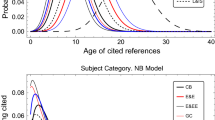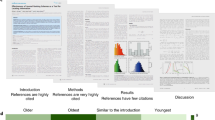Abstract
According to Garfield (1980),most scientists can name an example of an important discovery that had little initial impact on contemporary research. And he uses Mendel's work a classical example. Delayed recognition is sometimes used by scientists as an argument against citation-based indicators based on citation windows defined for a short- or medium-term initial period beginning with the paper's publication year. This study is focussed on a large-scale analysis of the citation history of all papers indexed in the 1980 annual volume of the Science Citation Index. The objective is two-fold, particularly, to analyse whether the share of delayed recognition papers is significant and whether such papers are typical of the work of their authors at that time. In a first step, the background of advanced bibliometric models by Glänzel, Egghe, Rousseau and Burrell of stochastic citation processes and first-citation distributions is described briefly. The second part is devoted to the bibliometric analysis of first-citation statistics and of the phenomenon of citation delay. In a third step, finally, delayed reception publications have been studied individually. Their topics and the citation patterns of other papers by the same authors have been studied to uncover principles of regularity or exceptionality of delayed reception publications.
Similar content being viewed by others
References
BURRELL, Q. L. (2001), Stochastic modelling of the first citation distribution. Scientometrics, 52: 3-12.
EGGHE, L., ROUSSEAU, R. (1990), Introduction to Informetrics. Quantitative Methods in Library, Documentation and Information Science. Amsterdam: Elsevier.
GARFIELD, E. (1980), Premature discovery or delayed recognition-Why? Current Contents, 21, May 26: 5-10.
GLäNZEL, W., SCHUBERT, A. (1992), Some facts and figures on highly cited papers in the sciences, 1981-1985, Scientometrics, 25: 373-380.
GLäNZEL, W. (1992), On some stopping times on citation processes. From theory to indicators. Information Processing and Management, 28: 53-60.
GLäNZEL, W., SCHOEPFLIN, U. (1994), A stochastic model for the ageing analyses of scientific literature, Scientometrics, 30: 49-64.
GLäNZEL, W., SCHOEPFLIN, U. (1995), A bibliometric study on ageing and reception processes of scientific literature. Journal of Information Science, 21: 37-53.
GLäNZEL, W., SCHUBERT, A. (1995), Predictive aspects of a stochastic model for citation processes, Information Processing & Management, 31: 69-80.
GLäNZEL, W., SCHUBERT, A., BRAUN, T. (2002), A relational charting approach to the world of basic research in twelve science fields at the end of the second millennium. Scientometrics, 55: 335-348.
ROUSSEAU, R. (1988), Citation distribution of pure mathematics journals. In: L. EGGHE, R. ROUSSEAU (Eds), Informetrics 87/88. Elsevier Science Publishers B.V., 249-260.
ROUSSEAU, R. (1994), Double exponential models for first-citation processes. Scientometrics, 30: 213-227.
SCHUBERT, A., GLäNZEL, W. (1986), Mean response time. A new indicator of journal citation speed with application to physics journals. Czechoslovak Journal of Physics, B 36: 121-125.
Author information
Authors and Affiliations
Corresponding author
Rights and permissions
About this article
Cite this article
Glänzel, W., Schlemmer, B. & Thijs, B. Better late than never? On the chance to become highly cited only beyond the standard bibliometric time horizon. Scientometrics 58, 571–586 (2003). https://doi.org/10.1023/B:SCIE.0000006881.30700.ea
Issue Date:
DOI: https://doi.org/10.1023/B:SCIE.0000006881.30700.ea




